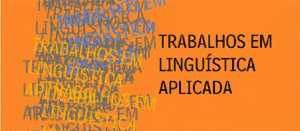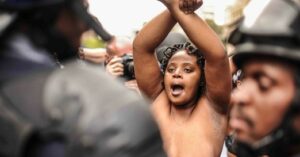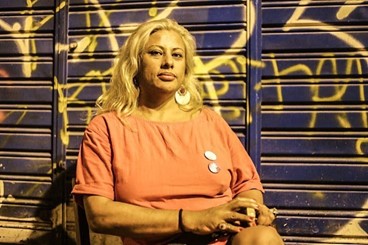Junot Oliveira Maia, professor, Faculdade de Letras, Universidade Federal de Minas Gerais, Brazil.
 In multiple authorship, a team of researchers affiliated with the Centre for Multilingualism and Diversities Research of the University of the Western Cape (CMDR @UWC), South Africa, led by professor Christopher Stroud, proposes the article “Talking parts, talking back: fleshing out Linguistic Citizenship”, which comprises the special issue “Resistance in contesting discursive practices in fragile democracies”, edited by Luiz Paulo da Moita Lopes and Joana Plaza Pinto (2021). A central concept of this text, Linguistic Citizenship emerges as an arrangement of voice and agency that opposes different kinds of violence imposed by the modern-colonial logic on bodies that do not fit the hegemonic model of “man” and humanity.
In multiple authorship, a team of researchers affiliated with the Centre for Multilingualism and Diversities Research of the University of the Western Cape (CMDR @UWC), South Africa, led by professor Christopher Stroud, proposes the article “Talking parts, talking back: fleshing out Linguistic Citizenship”, which comprises the special issue “Resistance in contesting discursive practices in fragile democracies”, edited by Luiz Paulo da Moita Lopes and Joana Plaza Pinto (2021). A central concept of this text, Linguistic Citizenship emerges as an arrangement of voice and agency that opposes different kinds of violence imposed by the modern-colonial logic on bodies that do not fit the hegemonic model of “man” and humanity.
Narrated by nine transgressor bodies that challenge this modernizing and civilizing endeavor, the text contains seven scenes that represent how vulnerability of transgressive bodies can also be the fertile place for incorporations of survival (LOPES et. al., 2019), resistance and re-existence (SOUZA, 2011) in the political arena. For example, one of the seven scenes describes how three young black South Africans were able to stop the aggression of their protest partners by imposing the sight of their naked breasts on armed police. In this situation, they were on a parade fighting for a less white and unfair university in a country still badly hurt by the apartheid regime.

Protest in South Africa. Image: Marie Claire SA.

Indianare Siqueira. Image: ANTRA – Associação Nacional de Travestis e Transsexuais.
The way in which the bodies of these three South African women gains power facing the violence practiced by a State of Police (Zaffaroni, 2015) overlaps with an episode in Brazil that involved the challenging and affronting exposure of the breasts of another transgressive body. The transvestigénere Indianare Siqueira paraded with her breasts on display during the 2012’s Slut Walk, thus questioning the action of the police in the middle of Atlântica Avenue, a Rio de Janeiro’s postcard. After all, if she were convicted and arrested for indecent exposure, the police would have had recognized her as a woman, thereby producing precedent for cases that claim gender identity recognition. On the other hand, if she were interpreted by the police officer as a man, she could not be punished for being shirtless in the middle of a parade and, further, it would reinforce how men and women do not have the same rights in Brazilian society, once men can walk freely through the streets without any upper clothing (BORBA, 2014).
The challenge of the transgressive bodies to break with oppressive and violent hegemonies exercised by systems – and by the cis-tem! – establishes nuances of transnational connection capable of linking diverse struggles for rights in the Global South, be them linguistic or of any other nature. In the current context of worsening social inequalities mainly produced by the rise of radical conservative politicians in positions of public representation, reflections such as the one proposed by this article are powerful and, therefore, fundamental to better understand how bodies and their languages are agents of struggle and claim.
References
BORBA, R. A linguagem importa? Sobre performance, performatividade e peregrinações conceituais. Cadernos Pagu [online]. 2014, vol. 43, pp. 441-474 [viewed 11 June 2021]. https://doi.org/10.1590/0104-8333201400430441. Available from: http://ref.scielo.org/39y2hc
MOITA LOPES, L. P. and PINTO, J. P. Resistências em práticas discursivas de contestação em democracias frágeis. Trabalhos em Linguística Aplicada [online]. 2021, no. 59, vol. 03 [viewed 11 June 2021]. Dossiê temático. Campinas: IEL/Unicamp, 765 pp.
LOPES, A. C.; FACINA, A. and SILVA, D. N. Nó em pingo d’água – Sobrevivência, cultura e linguagem. Rio de Janeiro/Florianópolis: Insular, 2019.
MAIA, J. O. Fogos Digitais: letramentos de sobrevivência no Complexo do Alemão/RJ. Tese de doutorado. Campinas: IEL/Unicamp, 2017.
SOUZA, A. L. S. Letramentos de Reexistência – Poesia, grafite, música, dança: hip-hop. São Paulo: Parábola Editorial, 2011.
ZAFFARONI, E. R. (2015) El derecho latinoamericano en la fase superior del colonialismo. Passagens [online]. 2015, vol. 07, no.02, pp. 182-243 [viewed 11 June 2021]. https://doi.org/10.15175/1984-2503-20157201. Available from: https://periodicos.uff.br/revistapassagens/article/view/47060
To read the article, acess
STROUD, C., et al. Talking parts, talking back: fleshing out Linguistic Citizenship. Trabalhos em Linguística Aplicada [online]. 2020, vol. 59, no.03 [viewed 11 June 2021]. https://doi.org/10.1590/010318138877711120201211. Available from: https://www.scielo.br/j/tla/a/xNrk6Pxq57fVNYhmHQXBvZk/abstract/?lang=en
External links
Trabalhos em Linguística Aplicada – TLA: www.scielo.br/tla
Como citar este post [ISO 690/2010]:












Recent Comments